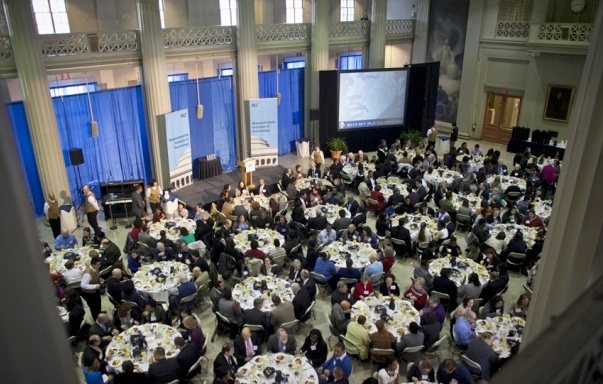MLK Jr. Breakfast addresses elements of meritocracy
MLK Jr. Breakfast addresses elements of meritocracy
David L. Chandler, MIT News Office February 6, 2013
Annual gathering features talks by former NBC executive as well as MIT students and administrators.

At MIT’s 39th annual Martin Luther King Jr. Breakfast Celebration this morning, members of the Institute community gathered to hear inspiring talks by student leaders; the announcement of this year’s roster of MLK Leadership Award recipients and MLK visiting scholars and professors; rousing musical interludes by the MIT Gospel Choir; and a keynote address by former NBC executive vice president Paula Madison.
Several speakers emphasized the importance of family in fostering an appreciation for education, saying that relatives helped them to set high goals and to maintain the self-discipline to achieve them. But they also spoke of the need for a community of people who have shared experience, and who can provide support, advice and encouragement.
Devin Cornish, an MIT junior majoring in mechanical engineering, said his parents and grandparents instilled an appreciation for the importance of a good education. He added that he also learned from the example of Martin Luther King Jr., who taught that all life is interrelated and stressed the importance of mutual support.
Cornish quoted King’s observation that “I cannot be what I ought to be until you are what you ought to be.” Echoing King again, he stressed that advancement should not be seen as a ladder — with one person advancing ahead of everyone else — but rather as an ocean of opportunity where people can follow their dreams in many different directions.
Joseph Keller, a graduate student in brain and cognitive sciences, said his parents told him, “‘The most important gift that we give you in this life is a good education.’ … They wholeheartedly believed that providing for me in this way was the most important thing they could do so that I might achieve and become a successful contributing member of society.”
But, Keller said, other support has been essential in realizing this goal. “I have been tremendously fortunate and blessed to have had amazing mentors and an incredible support system, while so many gifted children are deprived of the educational resources and life-changing opportunities that are necessary to succeed in such an achievement-based world,” he said, adding: “It is on the shoulders of Dr. King and many other prominent civil-rights leaders that I’m able to stand before you today as a student at a pre-eminent educational institution like MIT.”
Madison, who grew up in New York with parents of African, Jamaican and Chinese descent, worked as a journalist before rising to run the NBC affiliate in Los Angeles, later becoming a vice president of NBC and of General Electric, its parent company. She was named among the “75 Most Powerful African-Americans in Corporate America” by Black Enterprise magazine in 2005.
Madison stressed the importance of support and encouragement from peers and mentors, saying she had made a gift to her alma mater, Vassar College, to set up such a program. That gift, she said, was designed “to improve the life of all black staff, faculty and students there. … What I wanted to do was insert something that would make a change.”
In its pursuit of meritocracy, Madison urged the MIT community, “Don’t stop talking about it.” But talking alone is never enough, she added. The next step is, “Now, what are you going to do about it? Everybody may not feel as included as they’d like to be.”